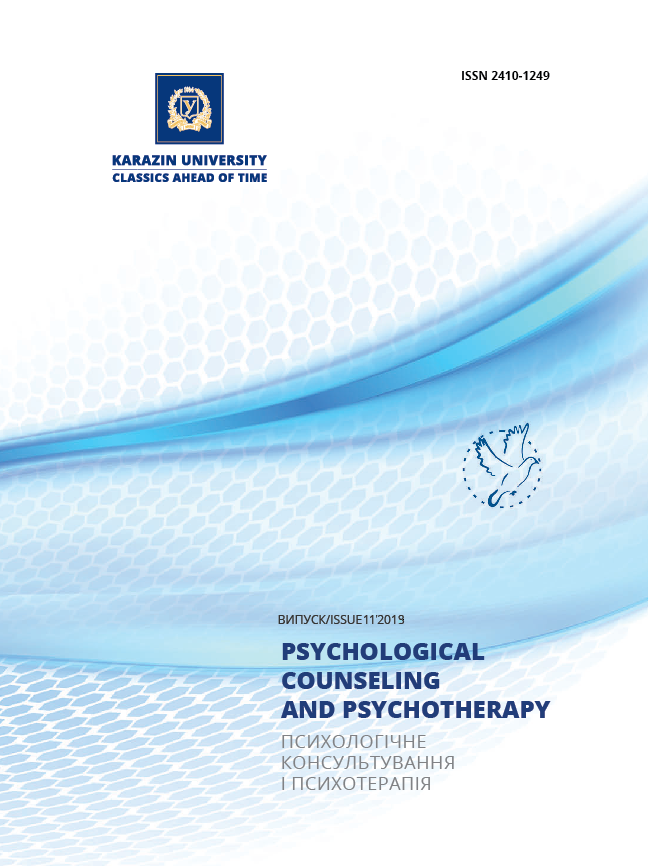Експірієнтальні підстави класифікації і психотерапії проблем розвитку особистості
Анотація
Розглянуто проблеми класифікації психологічних проблем, які особливо загострилися в період відмови від нозологічних (етіопатогенетичних) підстав: нормалізація патологічних проявів і толерантність до них складають суть культурного мейнстріму. Наведено підхід до етіопатогенетичної класифікації, побудованої на експірієнтальних підставах. Розглянуто чотири класифікаційних осі. Перша вісь класифікації - типи емоційних схем, які досить рано формуються в онтогенезі. Схема включає в себе п'ять компонентів: власне первинне «заторне» переживання, відповідна система ранніх спогадів, тілесні маніфестації (емоції-в-тілі), відповідні когнітивні репрезентації (інтерпретації) ситуації й мотивації. У літературі існують спроби класифікації таких схем, які були названі «ранні дезадаптивні схеми» (Дж. Янг), проте в даному варіанті класифікації плутаються первинні і вторинні «заторні» переживання і вони не прив'язані до певних онтогенетичних періодів і психотравм. Тому класифікація емоційних схем потребує подальшого опрацювання. Друга вісь класифікації - тип особистісного процесу, який визначається структурою організації психіки. Тип особистісного процесу, а їх виділяють чотири (оптимальний, крихкий, дисоціативний і психотичний), визначає здатність клієнта рухатися в психотерапії. Третя вісь класифікації - тип організмічного потоку і рівень його актуалізації. К. Роджерс не залишив переліку організмічних тенденцій. Четверта вісь класифікації - ступінь прийняття особистістю організмічного потоку, тобто глибина самоактуалізації.
Завантаження
Посилання
Achenbach, Thomas M., Ndetei, David M. (2018). Клинические модели поведенческих, эмоциональных и социальных проблем у детей и подростков. В Joseph M. Rey (ред.). Руководство по детской и подростковой психиатрии: в 2 т. (Т. 1, с. 86-103). Киев: Горобец.
Общественная ризома. Беседа с Александром Дьяковым. Электронный ресурс: https://www.vshm.science/blog/avkurpatov/921
Уніфікований клінічний протокол первинної, вторинної (спеціалізованої) та третинної (високоспеціалізованої) медичної допомоги «Гендерна дисфорія». Наказ МОЗ України № 972 від 15.09.2016.
Hart, J. (1970). The development of client-centered therapy. In J. Hart, T. Tomlinson (eds.). New Development in client-centered therapy (pp. 3-22). Boston: Houghton-Mifflin.
Greenberg, L., Safran, J. (1989). Emotion in Psychotherapy. American Psychologist, Vol. 44, No. I, 19-29.
Main, M. (1991). Metacognitive knowledge, metacognitive monitoring, and singular (coherent) vs multiple (incoherent) models of attachment. In C.M. Parkes, J.S. Hinde and D. Marris (eds.). Attachment Across the Life Cycle. (pp. 127-159.). London: Travistock/Routlege.
МакДугалл, Дж. (2007). Театры тела. Психоаналитический подход к лечению психосоматических расстройств. Москва: Когито-Центр.
Ницшке, Б. (1998). Значение сексуальности в трудах Зигмунда Фрейда. В Б. Ницшке (ред.). Энциклопедия глубинной психологии. З. Фрейд. Жизнь, работа, наследие (Т. 1., с. 365–406.). Москва: Издательство: Interna, Менеджмент.
Андрющенко, Т.Г. (2001). Истома любви. Харьков: ООО «Модель Вселенной», 2001.
Бондаренко, О.Р (2012). Этиология психических нарушений в клиент-центрированной терапии. Журнал практического психолога, 1. 102 – 119.
Галимзянова, М.Ф., Касьяник, П.М., Романова, Е.В. (2016). Выраженность ранних дезадаптивных схем и режимов функционирования схем у мужчин и женщин в период ранней, средней и поздней взрослости. Вестник СПбГУ, 16 (3), 109 – 125.
Кочарян, А.С. (2018). Протекание процесса в клиент-центрированной психотерапии. Психологічне консультування і психотерапія. Харківський національний університет імені В.Н. Каразіна, 9, 16-22.
Mearns, D., Thorne B. (2008). Person-centred counselling in action. London: Sage.
Warner, M.S. (2013). Person-centred therapy at the difficult edge: a developmentally based model of fragile and dissociated process. In D. Mearns and B. Thorne (eds.) Person-centred therapy today (pp. 144-171). London: Sage.








